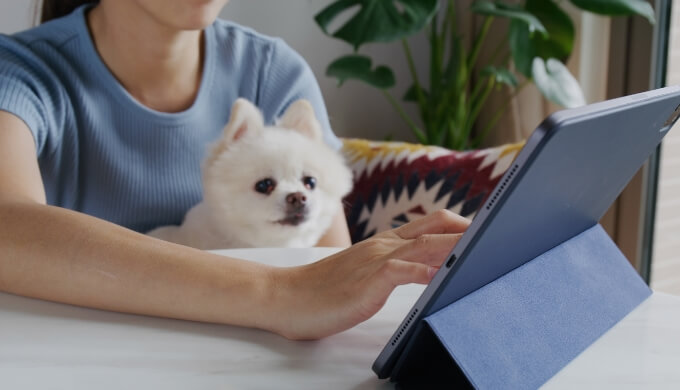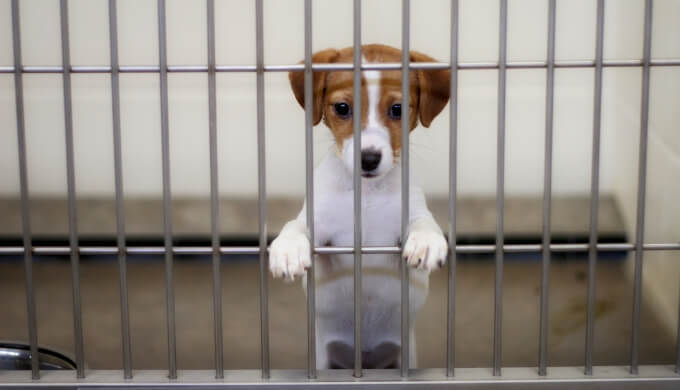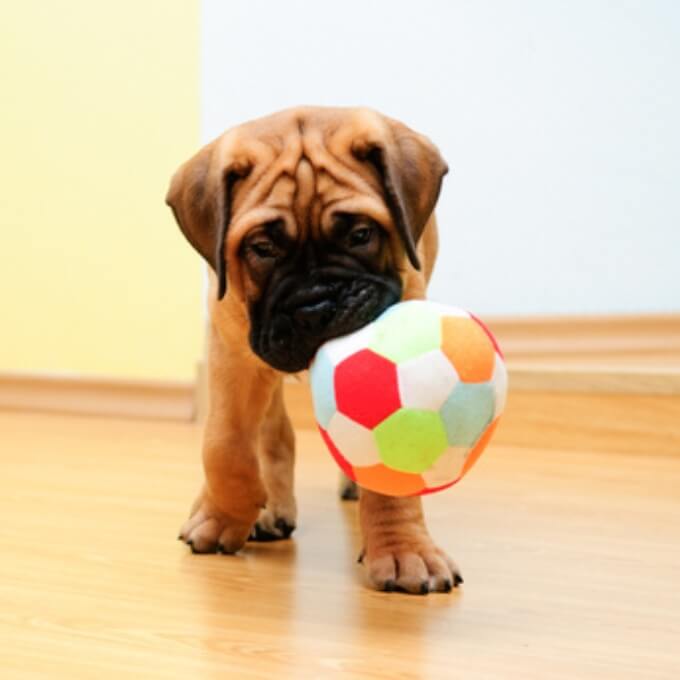It isn’t easy to raise a puppy when working full-time. A puppy has a lot of needs and can’t spend much time alone during the day like an older dog.
When raising a puppy with a full-time job, you should understand your puppy’s development and needs, the necessary commitment from you, and the importance of accepting support in the coming months to raise it successfully.
Contents
- Understanding the Commitment
- Puppy Development and Needs
- Creating a Puppy-Friendly Schedule
- Training and Socialization Strategies
- Utilizing Support Systems
- Enrichment and Exercise for Your Puppy
- Maintaining Balance and Well-Being When Working Full-Time With a Puppy at Home
Understanding the Commitment
Raising a puppy is a delightful and transformative experience, but it comes with a significant commitment that extends well beyond the initial joy of welcoming a new furry friend into your home. Puppies, much like human toddlers, are bundles of energy, curiosity, and need. They require constant supervision, guidance, and care to ensure they grow into well-adjusted adult dogs.
The commitment involves time, patience, and the willingness to adjust your daily routine to accommodate the needs of your growing puppy. It’s essential to be prepared for the responsibilities, from house training and puppy-proofing your home to ensuring proper nutrition and regular veterinary care.

Challenges and Rewards
Working full-time while raising a puppy presents a unique set of challenges. Puppies don’t always sleep through the night, and they need frequent bathroom breaks, consistent training, and plenty of playtime. The early days can be particularly demanding, as puppies require near-constant attention and can’t be left alone for extended periods. However, the rewards of raising a puppy are immeasurable.
As you navigate the challenges, you’ll develop a deep bond with your puppy, and the joy of watching them grow, learn, and become a loyal companion is an unparalleled experience. The effort you put into their development will pay off with a well-behaved, happy dog who enriches your life for years to come.
The Importance of Routine and Consistency
Establishing a routine is crucial when raising a puppy, especially if you’re balancing the demands of a full-time job. A consistent schedule helps your puppy feel secure and understand what to expect each day, which is vital for their emotional well-being and training progress. Routine includes regular feeding times, potty breaks, play sessions, and training periods.
Consistency in your approach to training and house rules will also help your puppy learn faster and reduce confusion. While it may take some effort to find a routine that works for both you and your puppy, the benefits of a well-structured day are worth it for your puppy’s development and your peace of mind.

Puppy Development and Needs
Raising a puppy is a journey that takes you through several stages of canine growth, each with its own unique challenges and milestones. Understanding these stages is crucial for providing the right care at the right time.
Stages of Puppy Development
- Neonatal Period (0-2 weeks): Puppies are born blind, deaf, and completely dependent on their mother for warmth and nutrition.
- Transitional Period (2-4 weeks): Puppies’ eyes and ears open, and they begin to stand and walk. The first teeth emerge as they start exploring their environment.
- Socialization Period (4-12 weeks): This critical period shapes a puppy’s future behavior. Exposure to various people, animals, and experiences is essential for developing a well-adjusted adult dog.
- Juvenile Period (3-6 months): Puppies continue to grow and learn. This is an ideal time for basic training and establishing routines.
- Adolescence (6-18 months): Puppies reach sexual maturity and may exhibit more independence and behavioral changes.
Physical and Emotional Needs
Puppies have specific physical needs including a balanced diet, vaccinations, regular exercise, and a safe environment. Their emotional needs are just as important, requiring affection, social interaction, and mental stimulation to thrive.
Consistent, positive training helps meet their emotional needs and builds a strong bond between you and your puppy. It’s also important to recognize signs of stress or fear and address them promptly with the help of a professional if needed.
Understanding Puppy Bladder Control
Bladder control is a common concern for new puppy owners, especially those working full-time.
Puppies have limited bladder control and will need to relieve themselves frequently:
- 8-10 weeks old: Every 30-60 minutes during the day.
- 10-12 weeks old: Every 2 hours.
- 3-6 months old: Every 3-4 hours.
As a rule of thumb, a puppy can control their bladder for one hour for every month of age. So, a two-month-old puppy might hold it for up to two hours. However, this varies among individuals and should be adjusted based on your puppy’s specific needs.
Creating a consistent schedule for bathroom breaks is essential. If you’re unable to be there, consider enlisting the help of a dog walker or a trusted neighbor. Remember, accidents will happen, and patience is key during this learning phase.
By understanding the stages of puppy development, their physical and emotional needs, and the specifics of bladder control, you can create a nurturing environment that supports your puppy’s growth into a healthy and happy dog.

Creating a Puppy-Friendly Schedule
When working full-time it is crucial to create a puppy-friendly schedule for your puppy. Puppies have special needs, and it is challenging to meet these needs when spending time away from home.
Designing a Daily Routine
Establishing a daily routine is crucial for your puppy’s development and your sanity. A consistent schedule helps your puppy understand what to expect each day and when to expect it, which can significantly reduce anxiety and behavioral issues.
Start by determining the times you’ll be home and the times you’ll be away, then build your puppy’s routine around that.
Morning: Begin with a morning routine that includes a potty break, a short play session, and breakfast. This helps your puppy start the day with a full belly and a chance to burn off some energy.
Midday: If you’re gone for more than four hours, arrange for a midday break. This could be a visit from a dog walker or a trip to a doggy daycare.
Evening: Once you’re home, provide another meal, more playtime, and a final potty break before bedtime. Consistency with feeding times, play, and potty breaks is key to a well-adjusted puppy.
Incorporating Necessary Breaks
Puppies have small bladders and need to go outside frequently. Plan for breaks every 3-4 hours for young puppies. As they grow, they’ll be able to hold it longer, but they should still have the opportunity to relieve themselves midday. Use a combination of crate training, puppy pads, and help from friends or professional services to ensure your puppy can relieve themselves as needed without accidents in the home.
Adjusting as Your Puppy Grows
As your puppy matures, their needs will change. They’ll be able to hold their bladder for longer periods, and their energy levels will fluctuate. Pay attention to your puppy’s cues and adjust the schedule accordingly. For example, older puppies may need more exercise in the morning to stay calm throughout the day or may be ready to transition away from midday breaks.
Remember, flexibility is essential. If your puppy seems restless or has an accident, it may be a sign that you need to revisit and adjust your schedule. Regularly assess your puppy’s behavior and health to ensure the routine still meets their needs as they grow.
Creating a puppy-friendly schedule while working full time is a balancing act that requires planning, patience, and a bit of help. By designing a daily routine, incorporating necessary breaks, and adjusting as your puppy grows, you can raise a happy and healthy companion, even with a busy work life.

Training and Socialization Strategies
The following points are the basic training needs that a puppy has.
Potty Training Basics
One of the first and most important tasks in raising a puppy is potty training. Establishing a consistent schedule is crucial. Take your puppy outside to the same spot each time and reward them for doing their business.
Puppies usually need to relieve themselves after waking up, eating, and during playtime. Remember, patience and positive reinforcement are key. Accidents will happen, but with a routine in place, your puppy will learn where and when it’s appropriate to go.
Preventing Separation Anxiety
Separation anxiety can be a significant issue for puppies, especially when their owners work full time. To prevent this, start by leaving your puppy alone for short periods and gradually increase the time. Provide them with a comfortable and safe space, such as a crate with familiar blankets and toys. Using interactive toys can also help keep them occupied. If possible, arrange for someone to check on your puppy during the day to break up their time alone.
Socialization and Obedience Training
Socialization is essential for a well-adjusted adult dog. Expose your puppy to different people, animals, environments, and sounds in a controlled and positive manner. Obedience training should also start early.
Teach basic commands like ‘sit’, ‘stay’, ‘come’, and ‘leave it’ in short, focused sessions to keep your puppy engaged. Puppy classes can be incredibly beneficial, providing both socialization and structured training. Remember, consistency is key in both socialization and obedience training.
Utilizing Support Systems
When working full-time you spend a lot of time away from your puppy if you don’t work from home. But even then it is crucial to get help and support from others to meet your puppy needs during the day.
Family, Friends, and Neighbors
When balancing the responsibilities of full-time work and raising a puppy, the support of family, friends, and neighbors can be invaluable. These individuals can offer a helping hand by checking in on your puppy, providing bathroom breaks, or simply offering companionship to alleviate the potential for separation anxiety.
To ensure a smooth process, it’s important to:
- Communicate clearly about your puppy’s routine and needs.
- Provide instructions for feeding, exercise, and any medication.
- Express gratitude for their assistance, whether through a heartfelt thank you, returning the favor, or a small gift.
Professional Services and Dog Daycares
Professional pet care services, such as dog walkers and dog daycares, offer structured care and socialization opportunities for your puppy. These services can be especially beneficial for high-energy breeds or puppies that require more attention and stimulation.
When selecting a professional service:
- Research and read reviews to find a reputable provider.
- Ensure they are licensed and insured, and their staff is trained in pet first aid.
- Visit the facility to assess cleanliness, safety, and the demeanor of staff and other dogs.
Technology and Pet Care Apps
Advancements in technology have made it easier than ever to monitor and care for your puppy while you’re at work.
Pet care apps and smart home devices can help you:
- Stay connected with live video feeds to check in on your puppy.
- Automate feedings and treat dispensing with smart feeders and treat cams.
- Arrange services such as dog walking or pet sitting with just a few taps on your smartphone.
By integrating these technologies into your puppy care routine, you can provide a stimulating environment for your puppy and peace of mind for yourself.
In conclusion, while raising a puppy with a full-time job presents challenges, a robust support system can make it a manageable and rewarding experience. By leveraging the help of family, friends, neighbors, professional services, and technology, you can ensure your puppy’s well-being and foster a loving, nurturing environment for them to grow and thrive.

Enrichment and Exercise for Your Puppy
Enough stimulation is important for a puppy. But to offer your puppy enough exercise and mental stimulation when working full-time is challenging, but crucial. Good planning of when, and what kind of stimulation to offer a puppy is necessary to help meet its needs.
Morning Exercise Routines
Starting the day with a morning exercise routine sets a positive tone for both you and your puppy. It’s an opportunity to burn off your puppy’s overnight energy and stimulate their mind. Depending on your puppy’s breed and age, a brisk walk or a short play session in a safe, enclosed area can be beneficial.
Remember, puppies have growing bodies, so keep the exercise gentle to avoid strain on their developing joints. Activities like a gentle game of fetch or a short walk where your puppy can sniff and explore are ideal. The goal is to tire them out just enough so they’re more relaxed during the day, especially while you’re working.
Interactive Toys and Games
Interactive toys and games are essential for a puppy’s development. They not only provide entertainment but also encourage problem-solving and can help prevent boredom-related behaviors such as chewing and digging. Puzzle toys that dispense treats when solved can keep your puppy engaged for long periods.
Tug-of-war with a sturdy rope toy can be a great physical workout and can also teach your puppy impulse control and commands like “drop it.” Always supervise playtime with interactive toys to ensure your puppy is safe and to reinforce positive play behaviors.
Ensuring Mental Stimulation
Mental stimulation is as crucial as physical exercise. A mentally stimulated puppy is less likely to engage in destructive behavior. Training sessions are an excellent way to provide mental enrichment; short, positive sessions throughout the day can help reinforce commands and tricks. Socialization is also a part of mental stimulation; exposing your puppy to different environments, sounds, and experiences can help them become well-adjusted adults.
Consider safe, controlled interactions with other vaccinated dogs or humans to enhance their social skills. Lastly, rotating toys can keep things fresh and exciting for your puppy, preventing boredom and stimulating their curiosity.
By incorporating these elements into your daily routine, you can ensure your puppy receives the necessary enrichment and exercise to grow into a healthy, well-behaved dog. Remember to adjust activities as your puppy grows and their needs change, always keeping safety and their physical limitations in mind.
Maintaining Balance and Well-Being When Working Full-Time With a Puppy at Home
When raising a puppy while working full time, it’s essential to manage your expectations realistically. Puppies require time, patience, and consistent training, and it’s important to understand that there will be setbacks and successes. Accept that your puppy may not be perfectly trained from the start, and that’s okay.
It’s a learning process for both of you. Set achievable goals for your puppy’s training and behavior, and celebrate the small victories along the way. Remember, consistency is key, and over time, your efforts will pay off as your puppy learns and grows.
Health and Nutrition Considerations
Ensuring your puppy’s health and well-being involves providing a balanced diet and proper nutrition. Puppies have specific dietary needs that differ from adult dogs, so it’s important to feed them high-quality puppy food that supports their growth and development. Always have fresh water available, and be mindful of the feeding schedule to coincide with potty training routines.
Additionally, be aware of the dangers of overfeeding, which can lead to obesity and related health issues. Consult with your veterinarian to determine the best diet plan for your puppy’s breed, size, and energy level.
The Role of Regular Veterinary Care
Regular veterinary care is crucial for maintaining your puppy’s health. Schedule an initial appointment soon after bringing your puppy home to begin a vaccination schedule and discuss preventive care such as flea, tick, and heartworm prevention. Your vet can also provide guidance on spaying or neutering and any breed-specific health concerns.
As your puppy grows, maintain a schedule of annual check-ups and stay up-to-date with vaccinations. If you notice any changes in your puppy’s behavior or health, don’t hesitate to contact your vet. Early detection and treatment of health issues can lead to better outcomes and a happier, healthier life for your puppy.

